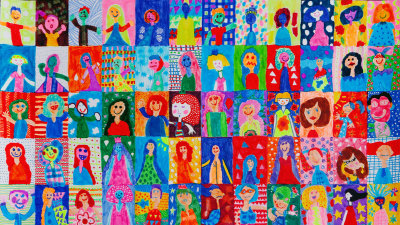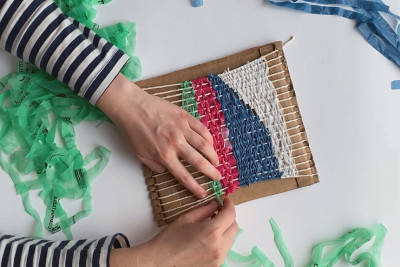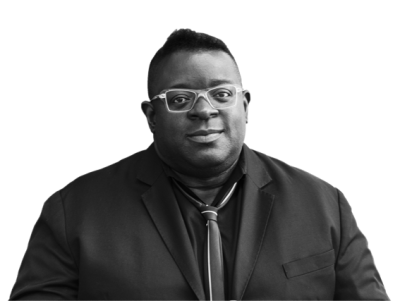Why EBacc must not exclude the arts
Why EBacc must not exclude the arts
By RA team
Published 30 June 2016
The English Baccalaureate currently excludes arts subjects from compulsory study. As plans go ahead for a parliamentary debate on 4 July, our artists and architects ask for your support in keeping creative subjects at the heart of education.
-
“With Britain’s longest-established art school at the heart of the Academy, the teaching of art is one of our founding principles,” says the RA’s President, Christopher Le Brun. “We strongly believe in the value of an arts education.”
It’s for that reason that we partner with the Pupil Premium Awards, celebrating teachers and schools supporting their most disadvantaged pupils, and why today we put our support behind the campaign to include creative subjects in the English Baccalaureate (EBacc) – and invite your support too.
The story
Introduced in 2010, the EBacc is a performance measure for schools, awarded when their students achieve a grade C or above at GCSE in a set of “core subjects”. Last year, the government made the study of the EBacc subjects mandatory. They account for 7 of the 8.1 subjects that the average student takes at GCSE, and do not include a creative subject. Since 2010, entries into all arts subjects at school have since dropped by 13%, with one of the most commonly withdrawn subjects being art, declining by 17%. The repercussions of the EBacc have been debated across the press, with a letter of protest appearing in the Telegraph signed by prominent arts figures. Nick Gibb, the Schools Minister, responded with a follow-up column refuting that the arts were being “squeezed out”.
The campaign
The move has been met with protest across the creative industries, with a petition calling for the arts to be included receiving over 100,000 signatures. On 4 July, it will become the subject of a parliamentary debate with the Education Secretary, Nicky Morgan. Ahead of the debate, three generations of artists – A level students, RA Schools students and Royal Academicians – united in the Royal Academy’s Life Room to show their support for the Bacc for the future campaign (see below for how to get involved). Here, we invite our artists and architects to share what the study of arts has meant for them, and why it must remain core to our education system.
-
I was the only girl to take a Metalwork CSE in my year. I gained confidence through learning how to make things.
Cathie Pilkington RA
-
What the artists say
Humphrey Ocean RA
“Compulsory” is an off-putting word. The study of arts should be made so exciting that young people cannot resist. If you are lucky, you make things with your hands at some point in your life. Some people (like me) never grow out of it. At the age of 65 and still doing it I would say it is the only real measure in this world.John Bunting, my art teacher at school, made a valiant attempt to make an alluring art room and the school didn’t manage to put me off. My mum helped me, showed me pictures, she introduced me to Van Gogh, and loved Pissarro and Karl Schmidt-Rottluff. Morris Weidman taught me at Tunbridge Wells Art School, where I went when I was 16 when my real life began, the life I wanted. And then Ian Dury taught me about drawing at Canterbury and became my best friend.
-
It's not about producing a profession of artists or architects. It’s about producing humans capable of enjoying the world they live in.
Piers Gough RA
-
Cathie Pilkington RA
I found school difficult. Art was always a refuge – something I could get completely absorbed in. The atmosphere of the practical workshops and art room in secondary school were where it all started for me; I was the only girl to take a Metalwork CSE in my year, and I gained confidence through learning how to make things.Creativity has always been central to human life – an integral part of being human, not something for the privileged. Not something to be grafted on as a middle-class entertainment. These subjects help children to think for themselves. They bring meaning to life. They allow us to talk about difficult subject matter as well as celebrating our own self-expression. The “success” of our lives does not just depend on money and career – but personal happiness and meaning. Our children need an education which values emotional, psychological, social and emotional intelligence, not just academic achievement. It’s vitally important that the arts are taken seriously and not considered an “optional extra.”
(Watch a recent video interview with Cathie Pilkington)
-
If you are lucky, you make things with your hands at some point in your life. Some people (like me) never grow out of it.
Humphrey Ocean RA
-
Mali Morris RA
Recent research shows that that an involvement in creative subjects helps the young brain to think and concentrate. The creative subjects form an introduction to a creative life – they invite us to think about what makes us human, how we can celebrate and enjoy that. Every child should be given the opportunity of a rounded education, and to choose the direction in which they feel they will flourish.Art education was hugely important for me. At a grammar school in North Wales I was lucky to have had two excellent art-teachers, one an elderly man called Mr Clayton Jones, who introduced me to both the art of the past and of the then present, and made it both serious and enjoyable. When he retired he was replaced by a young graduate from the Fine Art Department at the University of Newcastle, who advised me to apply there. I was accepted and so began my life as an artist.
-
Every child should be given the opportunity of a rounded education, and to choose the direction in which they feel they will flourish.
Mali Morris RA
-
Christopher Le Brun PRA
At the RA we believe that art is a natural part of a child’s education, as is sport or music. Art is one of our nation’s great strengths and ensures the continuity and vitality of culture into the future. The true wealth of a country is its citizens’ ability to think invent and imagine. But it is also important that young people understand and appreciate, and maybe disagree with what their parents think and do. So we mustn’t allow links to be broken. An ideal in education is for culture to accumulate skill and memory rather than be forgotten and rebuilt painfully by each successive generation.
-
We mustn’t allow links to be broken. An ideal in education is for culture to accumulate skill and memory.
Christopher Le Brun PRA
-
Piers Gough RA
I had a great art teacher who strongly encouraged me to be an architect, and in my education art was a very important balance alongside the maths and science. But why I want art studied in schools is not so much to produce a profession of artists or architects. Schooling isn’t all about getting a job – it’s about producing human beings who are capable of enjoying the world that they live in. We shouldn’t be concentrating on some aspects of human development and ignoring others – those that encourage creativity, imagination and emotion. It’s truly shocking that music, for instance, is often dropped from school curriculums now because it’s seen as expensive and unproductive. What’s interesting is that there has been quite a change amongst galleries in Britain, that now they almost all encourage and set up educational elements to their remit. Galleries are doing it – what’s needed is for government to take a grip on it.
-
-

Help us stand up for the arts!
Support the campaign
Your voice makes a difference. If you believe that creative subjects should be part of compulsory education, please add your support by taking the following action:
- Sign the petition
- Write to your MP (template letter at the below link)
- Post on social media with #Baccforthefuture
Thank you for your support.
-




